Mises, Ludwig von. Theory and History: An Interpretation of Social and Economic Evolution
Подождите немного. Документ загружается.

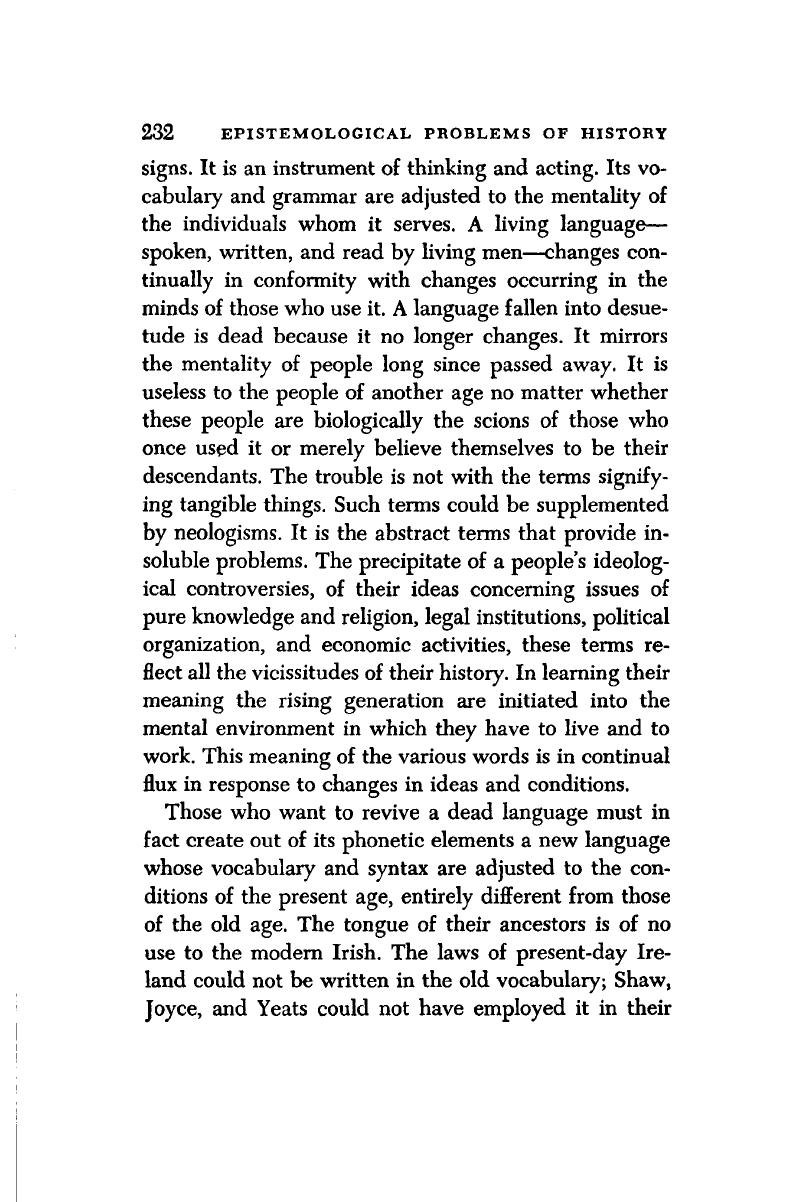
232 EPISTEMOLOGICAL PROBLEMS OF HISTORY
signs.
It is an instrument of thinking and acting. Its vo-
cabulary and grammar are adjusted to the mentality of
the individuals whom it serves. A living language-
spoken, written, and read by living men—changes con-
tinually in conformity with changes occurring in the
minds of those who use it. A language fallen into desue-
tude is dead because it no longer changes. It mirrors
the mentality of people long since passed away. It is
useless to the people of another age no matter whether
these people are biologically the scions of those who
once used it or merely believe themselves to be their
descendants. The trouble is not with the terms signify-
ing tangible things. Such terms could be supplemented
by neologisms. It is the abstract terms that provide in-
soluble problems. The precipitate of a people's ideolog-
ical controversies, of their ideas concerning issues of
pure knowledge and religion, legal institutions, political
organization, and economic activities, these terms re-
flect all the vicissitudes of their history. In learning then-
meaning the rising generation are initiated into the
mental environment in which they have to live and to
work. This meaning of the various words is in continual
flux in response to changes in ideas and conditions.
Those who want to revive a dead language must in
fact create out of its phonetic elements a new language
whose vocabulary and syntax are adjusted to the con-
ditions of the present age, entirely different from those
of the old age. The tongue of their ancestors is of no
use to the modern Irish. The laws of present-day Ire-
land could not be written in the old vocabulary; Shaw,
Joyce, and Yeats could not have employed it in their
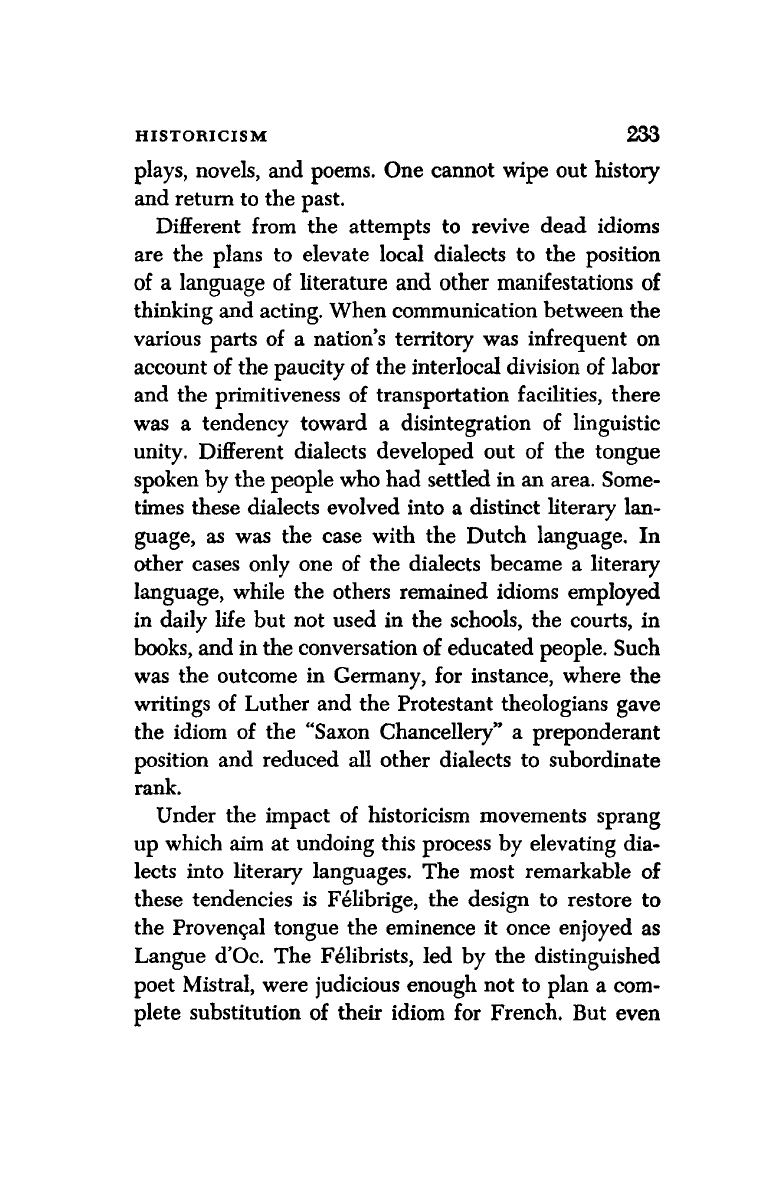
HISTORICISM 233
plays,
novels, and poems. One cannot wipe out history
and return to the past.
Different from the attempts to revive dead idioms
are the plans to elevate local dialects to the position
of a language of literature and other manifestations of
thinking and acting. When communication between the
various parts of a nation's territory was infrequent on
account of the paucity of the interlocal division of labor
and the primitiveness of transportation facilities, there
was a tendency toward a disintegration of linguistic
unity. Different dialects developed out of the tongue
spoken by the people who had settled in an area. Some-
times these dialects evolved into a distinct literary lan-
guage, as was the case with the Dutch language. In
other cases only one of the dialects became a literary
language, while the others remained idioms employed
in daily life but not used in the schools, the courts, in
books, and in the conversation of educated people. Such
was the outcome in Germany, for instance, where the
writings of Luther and the Protestant theologians gave
the idiom of the "Saxon Chancellery" a preponderant
position and reduced all other dialects to subordinate
rank.
Under the impact of historicism movements sprang
up which aim at undoing this process by elevating dia-
lects into literary languages. The most remarkable of
these tendencies is Felibrige, the design to restore to
the Provencal tongue the eminence it once enjoyed as
Langue d'Oc. The Felibrists, led by the distinguished
poet Mistral, were judicious enough not to plan a com-
plete substitution of their idiom for French. But even
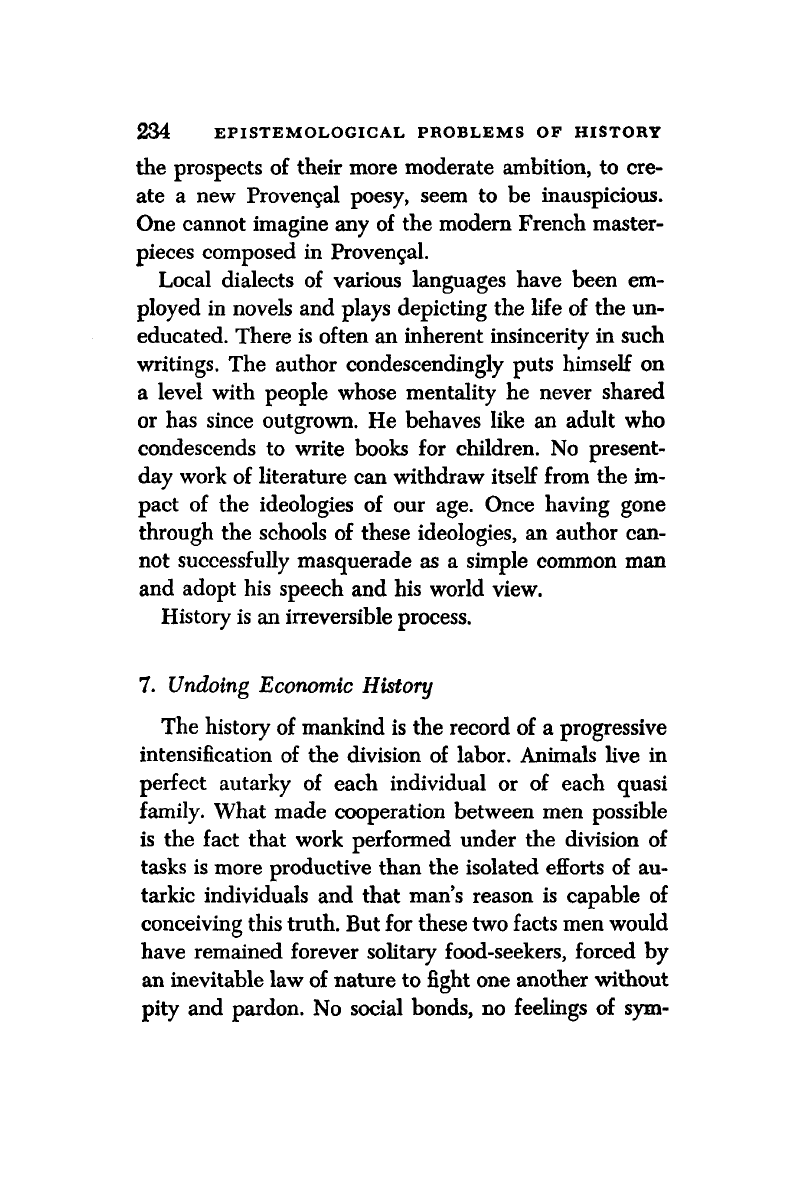
234 EPISTEMOLOGICAL PROBLEMS OF HISTORY
the prospects of their more moderate ambition, to cre-
ate a new Provencal poesy, seem to be inauspicious.
One cannot imagine any of the modern French master-
pieces composed in Provencal.
Local dialects of various languages have been em-
ployed in novels and plays depicting the life of the un-
educated. There is often an inherent insincerity in such
writings. The author condescendingly puts himself on
a level with people whose mentality he never shared
or has since outgrown. He behaves like an adult who
condescends to write books for children. No present-
day work of literature can withdraw itself from the im-
pact of the ideologies of our age. Once having gone
through the schools of these ideologies, an author can-
not successfully masquerade as a simple common man
and adopt his speech and his world view.
History is an irreversible process.
7. Undoing Economic History
The history of mankind is the record of a progressive
intensification of the division of labor. Animals live in
perfect autarky of each individual or of each quasi
family. What made cooperation between men possible
is the fact that work performed under the division of
tasks is more productive than the isolated efforts of au-
tarkic individuals and that man's reason is capable of
conceiving this truth. But for these two facts men would
have remained forever solitary food-seekers, forced by
an inevitable law of nature to fight one another without
pity and pardon. No social bonds, no feelings of sym-

HISTORICISM 235
pathy, benevolence, and friendship, no civilization
would have developed in a world in which everybody
had to see in all other men rivals in the biological com-
petition for a strictly limited supply of food.
One of the greatest achievements of eighteenth-cen-
tury social philosophy is the disclosure of the role
which the principle of higher productivity resulting
from division of labor has played in history. It was
against these teachings of Smith and Ricardo that the
most passionate attacks of historicism were directed.
The operation of the principle of division of labor
and its corollary, cooperation, tends ultimately toward
a world-embracing system of production. Insofar as the
geographical distribution of natural resources does not
limit the tendencies toward specialization and integra-
tion in the processing trades, the unhampered market
aims at the evolution of plants operating in a compara-
tively narrow field of specialized production but serv-
ing the whole population of the earth. From the point
of view of people who prefer more and better merchan-
dise to a smaller and poorer supply the ideal system
would consist in the highest possible concentration of
the production of each speciality. The same principle
that brought about the emergence of such specialists as
blacksmiths, carpenters, tailors, bakers and also physi-
cians,
teachers, artists and writers would finally result
in the emergence of one factory supplying the whole
oecumene with some particular article. Although the
geographical factor mentioned above counteracts the
full operation of this tendency, international division of
labor came into existence and will move forward until
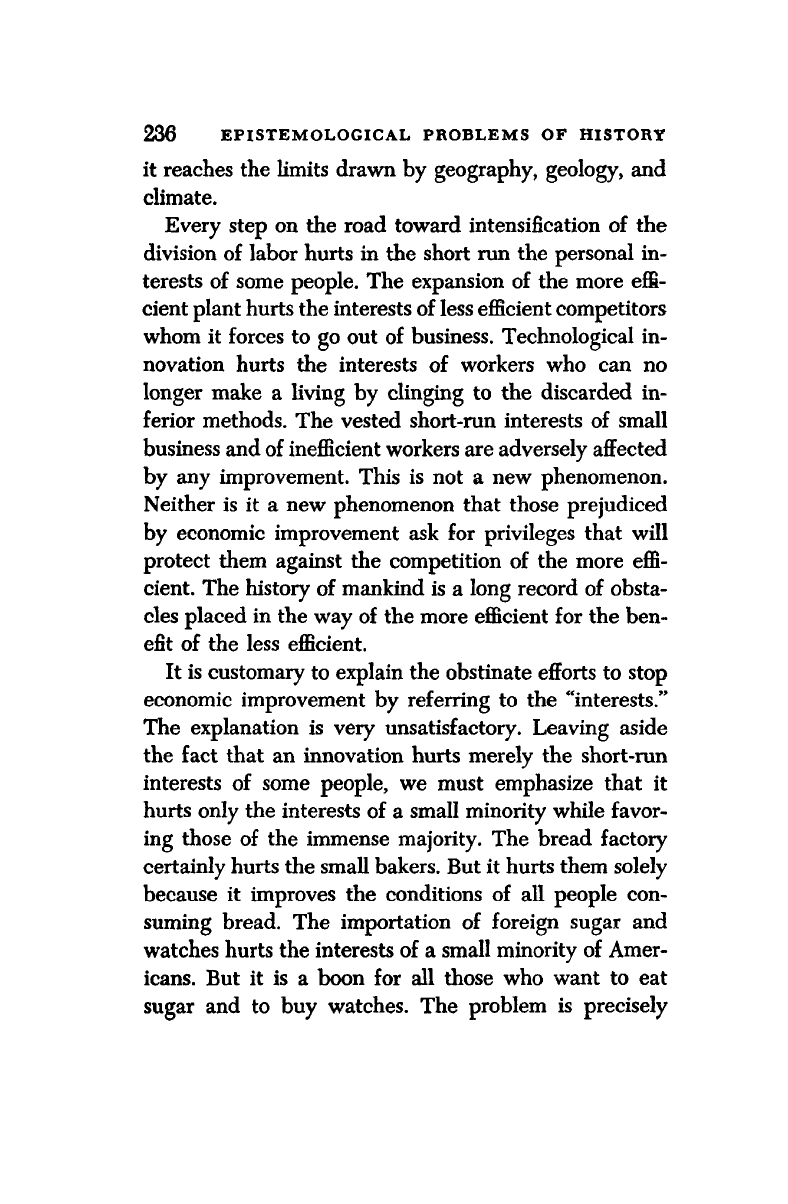
236 EPISTEMOLOGICAL PROBLEMS OF HISTORY
it reaches the limits drawn by geography, geology, and
climate.
Every step on the road toward intensification of the
division of labor hurts in the short run the personal in-
terests of some people. The expansion of the more effi-
cient plant hurts the interests of less efficient competitors
whom it forces to go out of business. Technological in-
novation hurts the interests of workers who can no
longer make a living by clinging to the discarded in-
ferior methods. The vested short-run interests of small
business and of inefficient workers are adversely affected
by any improvement. This is not a new phenomenon.
Neither is it a new phenomenon that those prejudiced
by economic improvement ask for privileges that will
protect them against the competition of the more effi-
cient. The history of mankind is a long record of obsta-
cles placed in the way of the more efficient for the ben-
efit of the less efficient.
It is customary to explain the obstinate efforts to stop
economic improvement by referring to the "interests."
The explanation is very unsatisfactory. Leaving aside
the fact that an innovation hurts merely the short-run
interests of some people, we must emphasize that it
hurts only the interests of a small minority while favor-
ing those of the immense majority. The bread factory
certainly hurts the small bakers. But it hurts them solely
because it improves the conditions of all people con-
suming bread. The importation of foreign sugar and
watches hurts the interests of a small minority of Amer-
icans.
But it is a boon for all those who want to eat
sugar and to buy watches. The problem is precisely

HISTORICISM 237
this:
Why is an innovation unpopular although it favors
the interests of the great majority of the people?
A privilege accorded to a special branch of business
is in the short run advantageous to those who at the
instant happen to be in this branch. But it hurts all
other people to the same extent. If everybody is priv-
ileged to the same degree, he loses as much in his ca-
pacity as a consumer as he wins in his capacity as a
producer. Moreover, everybody is hurt by the fact that
productivity in all branches of domestic production
drops on account of these privileges.
1
To the extent that
American legislation is successful in its endeavors to
curb big business, all are hurt because the products are
produced at higher costs in plants which would have
been wiped out in the absence of this policy. If the
United States had gone as far as Austria did in its fight
against big business, the average American would not
be much better off than the average Austrian.
It is not the interests that motivate the struggle
against the further intensification of the division of la-
bor, but spurious ideas about alleged interests. As in
any other regard, historicism in dealing with these prob-
lems too sees only the short-run disadvantages that re-
sult for some people and ignores the long-run advan-
tages for all of the people. It recommends measures
without mentioning the price that must be paid for
them. What fun shoemaking was in the days of Hans
Sachs and the Meistersinger! No need to analyze criti-
cally such romantic dreams. But how many people went
barefoot in those days? What a disgrace the big chemi-
1.
See above, pp. 32 f.
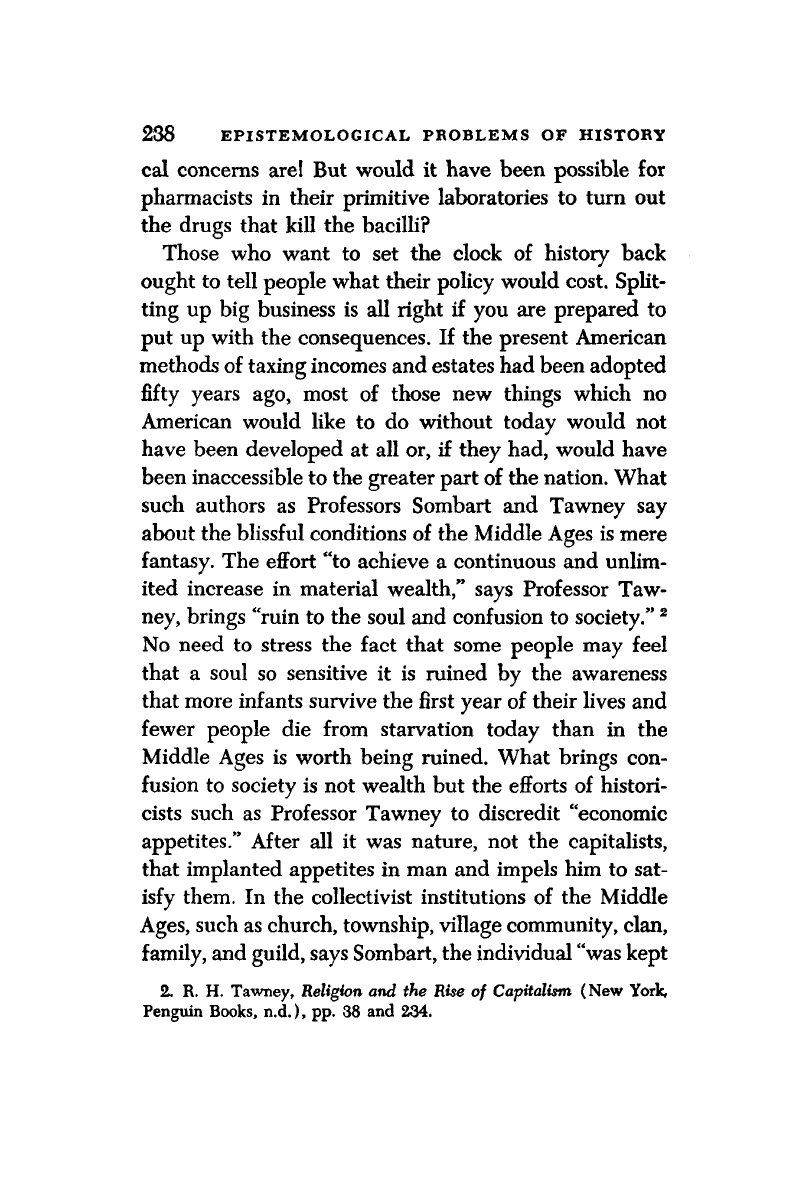
238 EPISTEMOLOGICAL PROBLEMS OF HISTORY
cal concerns are! But would it have been possible for
pharmacists in their primitive laboratories to turn out
the drugs that kill the bacilli?
Those who want to set the clock of history back
ought to tell people what their policy would cost. Split-
ting up big business is all right if you are prepared to
put up with the consequences. If the present American
methods of taxing incomes and estates had been adopted
fifty years ago, most of those new things which no
American would like to do without today would not
have been developed at all or, if they had, would have
been inaccessible to the greater part of the nation. What
such authors as Professors Sombart and Tawney say
about the blissful conditions of the Middle Ages is mere
fantasy. The effort "to achieve a continuous and unlim-
ited increase in material wealth," says Professor Taw-
ney, brings "ruin to the soul and confusion to society/'
2
No need to stress the fact that some people may feel
that a soul so sensitive it is ruined by the awareness
that more infants survive the first year of their lives and
fewer people die from starvation today than in the
Middle Ages is worth being ruined. What brings con-
fusion to society is not wealth but the efforts of histori-
cists such as Professor Tawney to discredit "economic
appetites/* After all it was nature, not the capitalists,
that implanted appetites in man and impels him to sat-
isfy them. In the collectivist institutions of the Middle
Ages,
such as church, township, village community, clan,
family, and guild, says Sombart, the individual "was kept
2.
R. H. Tawney, Religion and the Rise of Capitalism (New York,
Penguin Books, n.d.), pp. 38 and 234.
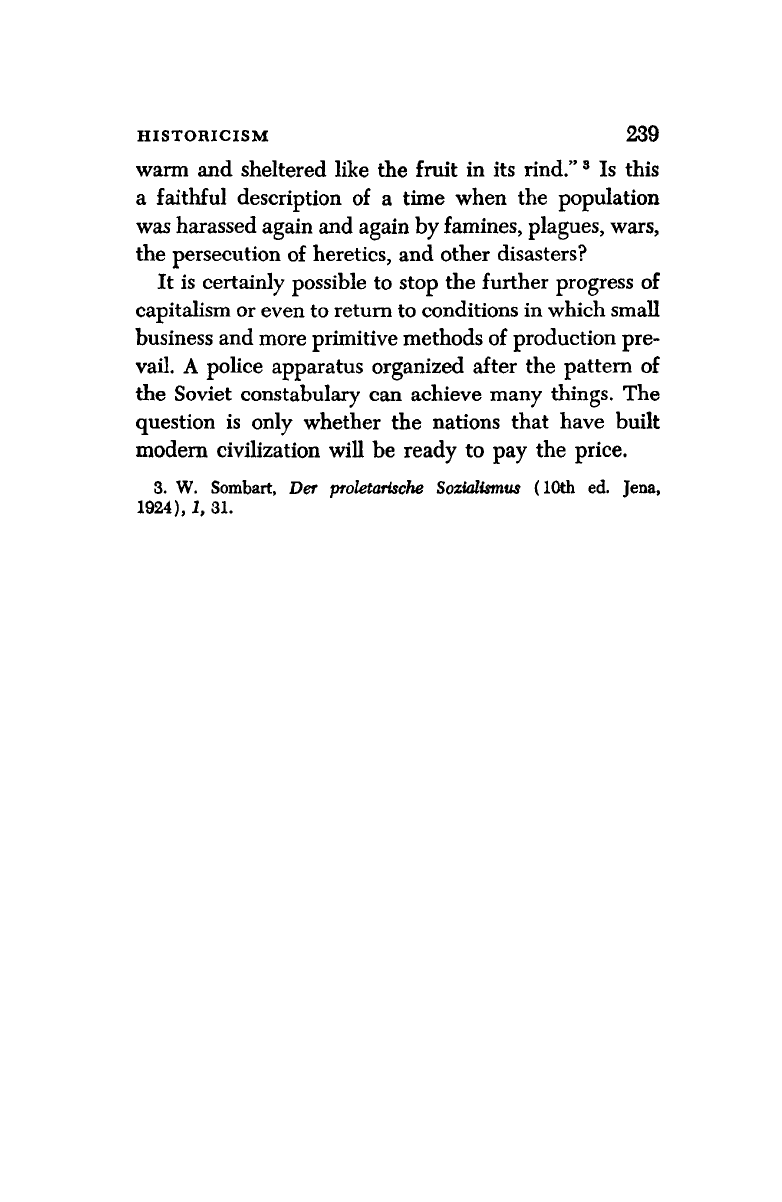
HISTORICISM 239
warm and sheltered like the fruit in its rind."
3
Is this
a faithful description of a time when the population
was harassed again and again by famines, plagues, wars,
the persecution of heretics, and other disasters?
It is certainly possible to stop the further progress of
capitalism or even to return to conditions in which small
business and more primitive methods of production pre-
vail. A police apparatus organized after the pattern of
the Soviet constabulary can achieve many things. The
question is only whether the nations that have built
modern civilization will be ready to pay the price.
3.
W. Sombart, Der proletarische Sozialismus (10th ed. Jena,
1924),
1, 31.
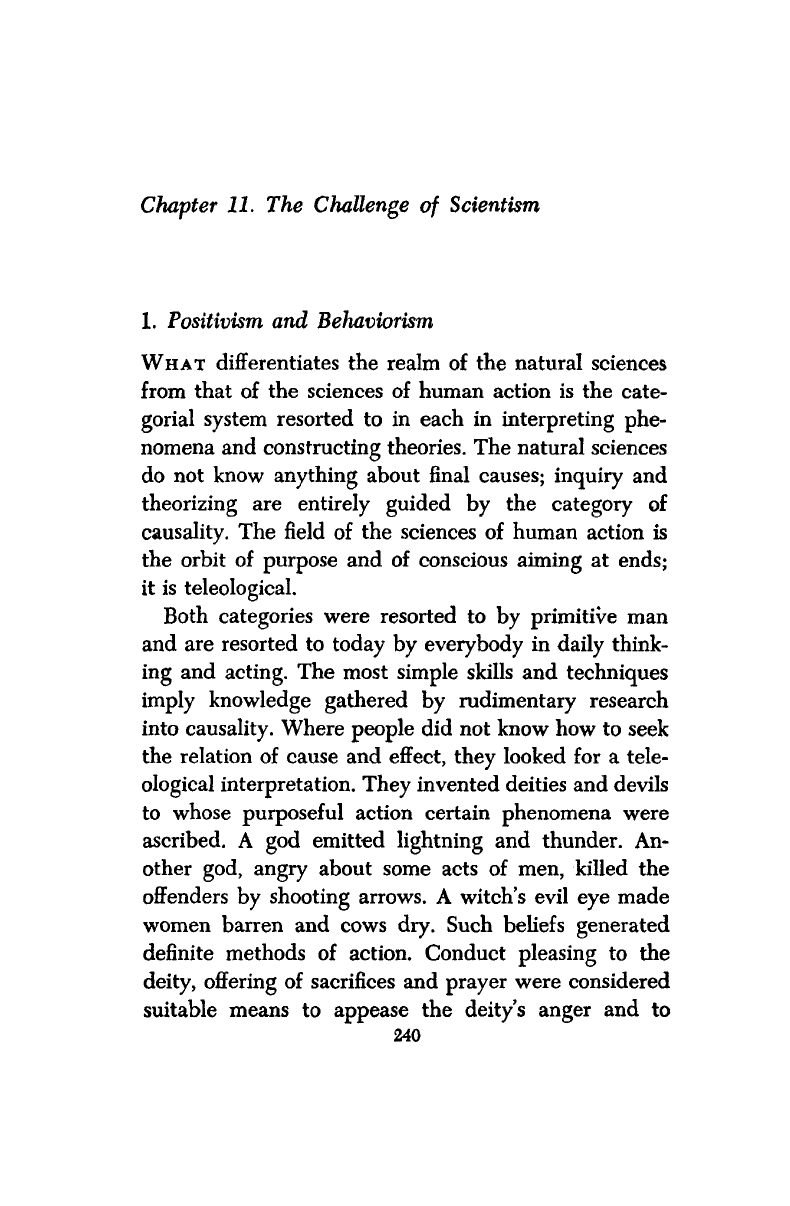
Chapter 11. The Challenge of Scientism
1.
Positivism and Behaviorism
WHAT differentiates the realm of the natural sciences
from that of the sciences of human action is the cate-
gorial system resorted to in each in interpreting phe-
nomena and constructing theories. The natural sciences
do not know anything about final causes; inquiry and
theorizing are entirely guided by the category of
causality. The field of the sciences of human action is
the orbit of purpose and of conscious aiming at ends;
it is teleological.
Both categories were resorted to by primitive man
and are resorted to today by everybody in daily think-
ing and acting. The most simple skills and techniques
imply knowledge gathered by rudimentary research
into causality. Where people did not know how to seek
the relation of cause and effect, they looked for a tele-
ological interpretation. They invented deities and devils
to whose purposeful action certain phenomena were
ascribed. A god emitted lightning and thunder. An-
other god, angry about some acts of men, killed the
offenders by shooting arrows. A witch's evil eye made
women barren and cows dry. Such beliefs generated
definite methods of action. Conduct pleasing to the
deity, offering of sacrifices and prayer were considered
suitable means to appease the deity's anger and to
240
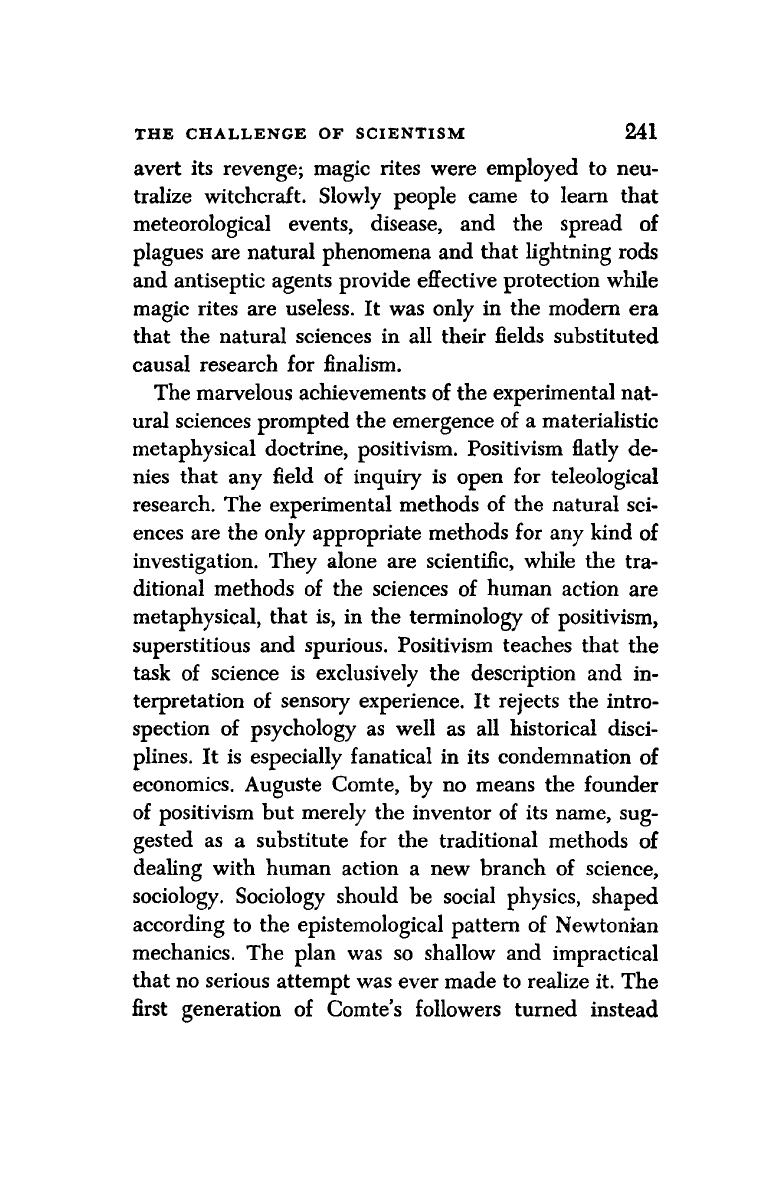
THE CHALLENGE OF SCIENTISM 241
avert its revenge; magic rites were employed to neu-
tralize witchcraft. Slowly people came to learn that
meteorological events, disease, and the spread of
plagues are natural phenomena and that lightning rods
and antiseptic agents provide effective protection while
magic rites are useless. It was only in the modern era
that the natural sciences in all their fields substituted
causal research for finalism.
The marvelous achievements of the experimental nat-
ural sciences prompted the emergence of a materialistic
metaphysical doctrine, positivism. Positivism flatly de-
nies that any field of inquiry is open for teleological
research. The experimental methods of the natural sci-
ences are the only appropriate methods for any kind of
investigation. They alone are scientific, while the tra-
ditional methods of the sciences of human action are
metaphysical, that is, in the terminology of positivism,
superstitious and spurious. Positivism teaches that the
task of science is exclusively the description and in-
terpretation of sensory experience. It rejects the intro-
spection of psychology as well as all historical disci-
plines. It is especially fanatical in its condemnation of
economics. Auguste Comte, by no means the founder
of positivism but merely the inventor of its name, sug-
gested as a substitute for the traditional methods of
dealing with human action a new branch of science,
sociology. Sociology should be social physics, shaped
according to the epistemological pattern of Newtonian
mechanics. The plan was so shallow and impractical
that no serious attempt was ever made to realize it. The
first generation of Comte's followers turned instead
